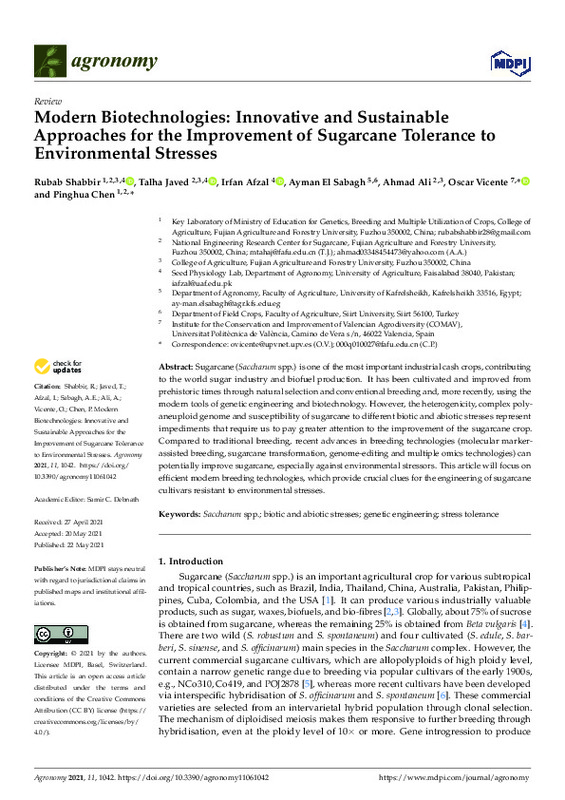JavaScript is disabled for your browser. Some features of this site may not work without it.
Buscar en RiuNet
Listar
Mi cuenta
Estadísticas
Ayuda RiuNet
Admin. UPV
Modern Biotechnologies: Innovative and Sustainable Approaches for the Improvement of Sugarcane Tolerance to Environmental Stresses
Mostrar el registro sencillo del ítem
Ficheros en el ítem
| dc.contributor.author | Shabbir, Rubab
|
es_ES |
| dc.contributor.author | Javed, Talha
|
es_ES |
| dc.contributor.author | Afzal, Irfan
|
es_ES |
| dc.contributor.author | El Sabagh, Ayman
|
es_ES |
| dc.contributor.author | Ali, Ahmad
|
es_ES |
| dc.contributor.author | Vicente, Oscar
|
es_ES |
| dc.contributor.author | Chen, Pinghua
|
es_ES |
| dc.date.accessioned | 2022-05-30T18:04:52Z | |
| dc.date.available | 2022-05-30T18:04:52Z | |
| dc.date.issued | 2021-06 | es_ES |
| dc.identifier.uri | http://hdl.handle.net/10251/182981 | |
| dc.description.abstract | [EN] Sugarcane (Saccharum spp.) is one of the most important industrial cash crops, contributing to the world sugar industry and biofuel production. It has been cultivated and improved from prehistoric times through natural selection and conventional breeding and, more recently, using the modern tools of genetic engineering and biotechnology. However, the heterogenicity, complex polyaneuploid genome and susceptibility of sugarcane to different biotic and abiotic stresses represent impediments that require us to pay greater attention to the improvement of the sugarcane crop. Compared to traditional breeding, recent advances in breeding technologies (molecular marker-assisted breeding, sugarcane transformation, genome-editing and multiple omics technologies) can potentially improve sugarcane, especially against environmental stressors. This article will focus on efficient modern breeding technologies, which provide crucial clues for the engineering of sugarcane cultivars resistant to environmental stresses | es_ES |
| dc.description.sponsorship | This research was funded by the Natural Science Foundation, PR China (grant numbers: KF2015080, KF2015118, KFA17263A, KJG16005R). | es_ES |
| dc.language | Inglés | es_ES |
| dc.publisher | MDPI | es_ES |
| dc.relation.ispartof | Agronomy | es_ES |
| dc.rights | Reconocimiento (by) | es_ES |
| dc.subject | Saccharum spp. | es_ES |
| dc.subject | Biotic and abiotic stresses | es_ES |
| dc.subject | Genetic engineering | es_ES |
| dc.subject | Stress tolerance | es_ES |
| dc.subject.classification | BIOQUIMICA Y BIOLOGIA MOLECULAR | es_ES |
| dc.title | Modern Biotechnologies: Innovative and Sustainable Approaches for the Improvement of Sugarcane Tolerance to Environmental Stresses | es_ES |
| dc.type | Artículo | es_ES |
| dc.identifier.doi | 10.3390/agronomy11061042 | es_ES |
| dc.relation.projectID | info:eu-repo/grantAgreement/NSFC//KF2015080/ | es_ES |
| dc.relation.projectID | info:eu-repo/grantAgreement/NSFC//KF2015118/ | es_ES |
| dc.relation.projectID | info:eu-repo/grantAgreement/NSFC//KFA17263A/ | es_ES |
| dc.relation.projectID | info:eu-repo/grantAgreement/NSFC//KJG16005R/ | es_ES |
| dc.rights.accessRights | Abierto | es_ES |
| dc.contributor.affiliation | Universitat Politècnica de València. Departamento de Biotecnología - Departament de Biotecnologia | es_ES |
| dc.description.bibliographicCitation | Shabbir, R.; Javed, T.; Afzal, I.; El Sabagh, A.; Ali, A.; Vicente, O.; Chen, P. (2021). Modern Biotechnologies: Innovative and Sustainable Approaches for the Improvement of Sugarcane Tolerance to Environmental Stresses. Agronomy. 11(6):1-20. https://doi.org/10.3390/agronomy11061042 | es_ES |
| dc.description.accrualMethod | S | es_ES |
| dc.relation.publisherversion | https://doi.org/10.3390/agronomy11061042 | es_ES |
| dc.description.upvformatpinicio | 1 | es_ES |
| dc.description.upvformatpfin | 20 | es_ES |
| dc.type.version | info:eu-repo/semantics/publishedVersion | es_ES |
| dc.description.volume | 11 | es_ES |
| dc.description.issue | 6 | es_ES |
| dc.identifier.eissn | 2073-4395 | es_ES |
| dc.relation.pasarela | S\438101 | es_ES |
| dc.contributor.funder | National Natural Science Foundation of China | es_ES |
| dc.subject.ods | 02.- Poner fin al hambre, conseguir la seguridad alimentaria y una mejor nutrición, y promover la agricultura sostenible | es_ES |








